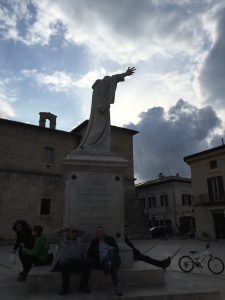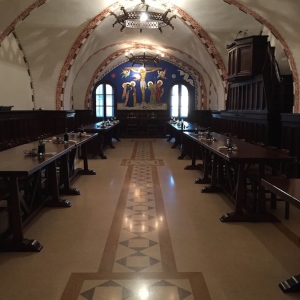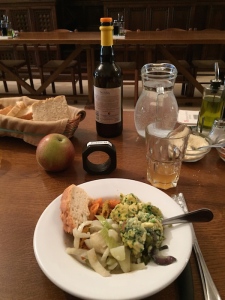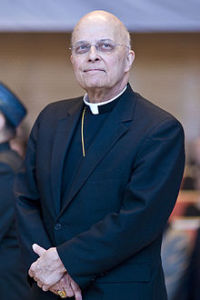April 18, 2015, Friday — Vespers in Norcia
“I pray that I and all those God has given me to know and love here might live in such a way that God’s will for the salvation of the world will be realized.”
—Prayer of Cardinal Francis George of Chicago, who died yesterday at the age of 78
NORCIA, Italy — At 5:30 p.m. today, the monks of Norcia sang Saturday Vespers.
Outside, a cloud-covered sky was heralding the coming of evening above the outstretched hand of the great statue in the town square of St. Benedict of Nursia, Patron Saint of Europe, who was born here in 480 A.D.
At the end of Vespers, the monks sang the Magnificat, the hymn of the Virgin Mary after she knew she would be the mother of the Messiah.
It is one of the most moving hymns in the tradition and liturgy of the Church.
It speaks of the goodness of the Almighty, and of his remembrance for those who are weak and humble.
After Vespers, I joined the monks for dinner in their refectory. The refectory has been increased in size, and now has room for perhaps 40 to eat together — perhaps a few more, if the seats are set closely…
The meal was of leftovers from lunch. The beer on the table is a beer the monks themselves make to help support themselves. It is not yet available for general distribution in the United States, but it a distinctive, flavorful beer.
On the table was my linen napkin, in a little wooden ring with my name on it: “Robert M.”
But after dinner, I received sad news.
Yesterday, April 17, Cardinal Francis George, Archbishop of Chicago, passed away.
Here is a picture of the man who was one of the most profound minds and purest hearts in the Catholic Church in the United States. His intellect and learning caused him to be nick-named “the American Joseph Ratzinger.”
He was only 78.
I knew the cardinal. We had spoken on several occasions over the years. He had a profound understanding of the tension between the Christian faith and this “secular” world and the various agendas of this secular and relativistic age.
On August 26, 2012, he published a column in the Catholic New World, the archdiocesan paper, about his long battle with cancer, diagnosed in 2005 — the cancer which took his life yesterday at the age of 78. (He had contracted polio at the age of 13, and had spent most of his subsequent life in considerable physical pain due to the after-effects of polio).
The column ended with these words:
“We experience the network of faith and love that is God’s Kingdom in our prayers for one another. I am profoundly grateful for the prayers already said and those promised: the Masses offered, the rosaries meditated, the novenas prayed.
“Over the years, I have seldom written about myself in this column, because the bishop’s job is to point to Christ, not to himself.
“Even in what will probably be a trying time for me in the next several months, I plan to say little about my cancer and its treatment.
“How can we know what to say when our knowledge is so limited? I would hope that people might reflect upon God’s goodness and grow closer to Christ.
“Then even my sickness and, at some point at a still unknown time and way, my death will be an answer to what I prayed many years ago: that I and all those God has given me to know and love here might live in such a way that God’s will for the salvation of the world will be realized. God bless you.“
In his October 23-November 1, 2012, column in the same paper, George discussed a remark he had made which became perhaps the most famous single remark of his life: “I expect to die in bed, my successor will die in prison and his successor will die a martyr in the public square.”
He explained his remark this way:
“Speaking a few years ago to a group of priests, entirely outside of the current political debate, I was trying to express in overly dramatic fashion what the complete secularization of our society could bring. I was responding to a question and I never wrote down what I said, but the words were captured on somebody’s smart phone and have now gone viral on Wikipedia and elsewhere in the electronic communications world.
“I am (correctly) quoted as saying that I expected to die in bed, my successor will die in prison and his successor will die a martyr in the public square.
“What is omitted from the reports is a final phrase I added about the bishop who follows a possibly martyred bishop: ‘His successor will pick up the shards of a ruined society and slowly help rebuild civilization, as the Church has done so often in human history.‘
“What I said is not ‘prophetic’ but a way to force people to think outside of the usual categories that limit and sometimes poison both private and public discourse.”
And he concluded that essay this way, in words worth reflecting upon:
“Instead of a world living in peace because it is without religion, why not imagine a world without nation states?… Every major war in the last 300 years has been fought by nation states, not by the Church… The state apparatus for investigating civilians now is far more extensive than anything dreamed up by the Spanish Inquisition, although both were created to serve the same purpose: to preserve a government’s public ideology and control of society, whether based on religion or on modern constitutional order.
“…The point is that the greatest threat to world peace and international justice is the nation state gone bad, claiming an absolute power, deciding questions and making ‘laws’ beyond its competence.
“Few there are, however, who would venture to ask if there might be a better way for humanity to organize itself for the sake of the common good. Few, that is, beyond a prophetic voice like that of Dorothy Day, speaking acerbically about ‘Holy Mother the State,’ or the ecclesiastical voice that calls the world, from generation to generation, to live at peace in the kingdom of God.
“God sustains the world, in good times and in bad. Catholics, along with many others, believe that only one person has overcome and rescued history: Jesus Christ, Son of God and Son of the Virgin Mary, savior of the world and head of his body, the Church.
“Those who gather at his cross and by his empty tomb, no matter their nationality, are on the right side of history. Those who lie about him and persecute or harass his followers in any age might imagine they are bringing something new to history, but they inevitably end up ringing the changes on the old human story of sin and oppression. There is nothing ‘progressive’ about sin, even when it is promoted as ‘enlightened.’
“The world divorced from the God who created and redeemed it inevitably comes to a bad end. It’s on the wrong side of the only history that finally matters.”
And he concluded, referring to the Synod on the New Evangelization which was taking place in Rome at that time, in 2012, “because entire societies, especially in the West, have placed themselves on the wrong side of history” (but he might as well have been referring to the Synod on the Family, which will have it’s second and final session this coming October, 2015): “Let’s pray the rosary so that the Holy Spirit will guide and strengthen the bishops and others at the Synod as they deliberate about the challenges to preaching and living the Gospel at this moment in human history.”
May the soul of this faithful servant of both man and God rest in peace.
For him, too, the monks of Norcia prayed tonight, chanting in the words of the Psalmist, in Latin:
“Quoniam tu es, Domine, spes mea…” (“For you are, Lord, my hope.”)
Correction: I wrote yesterday that there are 12 US Supreme Court Justices. This is an error. Theres are nine US Supreme Court Justices.
Note: For those who would like to travel with us on pilgrimage:
(1) In mid-July 2015, we will travel with a small group of Inside the Vatican readers on our annual “Urbi et Orbi” pilgrimage to Russia, Turkey and the Vatican, to visit eastern Orthodox leaders, shrines and monasteries, and to talk with Vatican officials about ecumenical relations between Catholics and Orthodox;
(2) On December 8, 2015, and again on November 20, 2016, we will be gathering in Rome to be present when Pope Francis opens the Holy Door to begin his Special Jubilee of Mercy, and when he closes the door to end the Jubilee Year. If you would like to join us on one or more of these pilgrimages, email now for more information…
We keep all of these pilgrimages small. Please contact us if you would like your name to be placed on a waiting list, to hold your spot.
Also, if you have not yet subscribed to the magazine, please do so now. Every subscriber is important to us. To subscribe, click here.
What is the glory of God?
“The glory of God is man alive; but the life of man is the vision of God.” —St. Irenaeus of Lyons, in the territory of France, in his great work Against All Heresies, written c. 180 A.D.











Facebook Comments